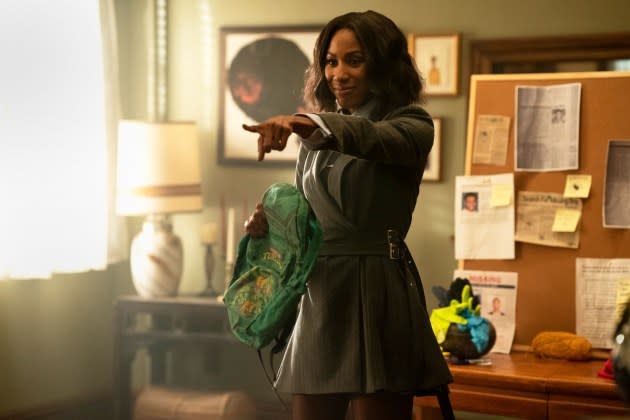‘Diarra From Detroit’ Is a Murder Mystery, a Romance, a Comedy — and a Star-Making Showcase
- Oops!Something went wrong.Please try again later.
- Oops!Something went wrong.Please try again later.
- Oops!Something went wrong.Please try again later.

Diarra From Detroit is, at various points, a hard-boiled mystery, a quarter-life crisis comedy, a complicated love triangle (that’s occasionally a quadrangle), and an ensemble hangout show about a group of longtime friends. Some of these elements in theory make sense together — though in theory they should not all fit within the same series. But the reason Diarra, which debuted last week on the BET+ streaming service, is among this year’s most pleasant TV surprises is how much it all makes sense when you watch it.
Diarra Kilpatrick created the show and plays the title role: a public school teacher in her native Detroit. Still struggling with the end of her marriage to handsome attorney Swa (Morris Chestnut), she goes on a Tinder date with Chris (Shannon Wallace) in hopes Swa will hear about it and get jealous enough to come back to her. Instead, she and Chris share a perfect night together. When he doesn’t contact her afterwards, she becomes convinced that something bad has happened to him, because how could a man with whom she had such an obvious connection just ghost her like that?
More from Rolling Stone
As Diarra begins channeling her “inner Nancy Drew,” her friends Aja (Dominique Perry), Tea (Bryan Terrell Clark), and Moni (Claudia Logan) insist she’s in denial about both Chris and Swa. At first, they’re annoyed by this increasingly weird investigation, which involves an unsolved Nineties kidnapping, the Greek mob, a naked Russian hit man who’s very into BDSM, retired players from the Detroit Pistons and Lions, a Mary J. Blige cassette, and more. But soon the group of them — plus Moni’s husband Roman (Bechir Sylvain) and friendly neighborhood criminal Danger (Jon Chaffin) — have to admit that Diarra is onto something here, and what starts out as an irrational quest becomes an enthusiastic group mission.
Kilpatrick has been hovering around the edge of the TV business for a long time, with small recurring roles in everything from Private Practice to HBO’s Perry Mason remake, in addition to writing for several comedies like Tracy Morgan’s The Last O.G. Though she got an Emmy nomination for a late 2010s webseries called American Koko, this feels like Kilpatrick wanted to demonstrate everything she can do, in a way the business hasn’t previously let her.
And as showcases of versatility and star power go, this is pretty great. Kilpatrick has clearly written to her own strengths, but it turns out she has a lot of those. She is convincingly funny, sad, frightened, furious — whatever emotion is required, she plays it well, and with charisma. Like a lot of classic detective fiction(*), much of the story is narrated by our heroine. Abundant voiceover can be a crutch, or distracting (Apple’s Palm Royale is practically drowning in it). But as both writer and performer, Kilpatrick knows how to keep it lively, even as its most baldly exposition-heavy. In one episode, Diarra is narrating about the importance of a missing sneaker when a man bumps into her on the street. “Ow!” her internal monologue continues. “Can I have a contemplative moment? Fuck!”
(*) There’s even an upcoming episode that leans even more into the hard-boiled space, including a black-and-white flashback sequence about the Nineties cold case that Diarra believes is connected to Chris’s disappearance.
In general, Diarra is at its best when it’s aiming for comedy and mystery at the same time, in ways where the two tones enhance each other rather than clashing. It’s a show full of smart, amusing edits, like Diarra leading her reluctant students in a chant of “There is no need for that weed,” followed immediately by a shot of her getting high at home that night. A later episode is entertainingly modeled on the Goodfellas sequence where Henry Hill keeps narrating about all the things he has to do that day (sell cocaine, stir the sauce, etc.), and it seems clear that Diarra’s day will not end well for her, either. And to trick a group of former strippers into explaining what they know about the case, Diarra claims to be making a documentary called Griots on the Fringe, which is as good as it gets for fake doc titles.
It all moves quickly (episodes hover around 40 minutes apiece). The chemistry among the ensemble is strong enough to carry the subplots that have little or nothing to do with Diarra, like entrepreneur Aja attempting to both get onto a 35 under 35 list while also maintaining a chastity vow as she dates a pro football player. And the relationships between the characters — including Phylicia Rashad as the mother of the boy who went missing 30 years ago — keep evolving in interesting ways.
The labyrinthine plot is where the series is at its weakest, though that’s more a hallmark of the genre than any failing of this particular show. That said, the finale is largely focused on that complicated story, and in a way that doesn’t wrap everything up, preferring to leave things open for a second season. But by that point, Diarra From Detroit has more than earned another season, just as Diarra Kilpatrick has more than earned a chance to spread her wings even beyond this very entertaining project.
The first four episodes of Diarra From Detroit are now streaming on BET+, with additional episodes releasing each Thursday. I’ve seen all eight episodes.
Best of Rolling Stone
